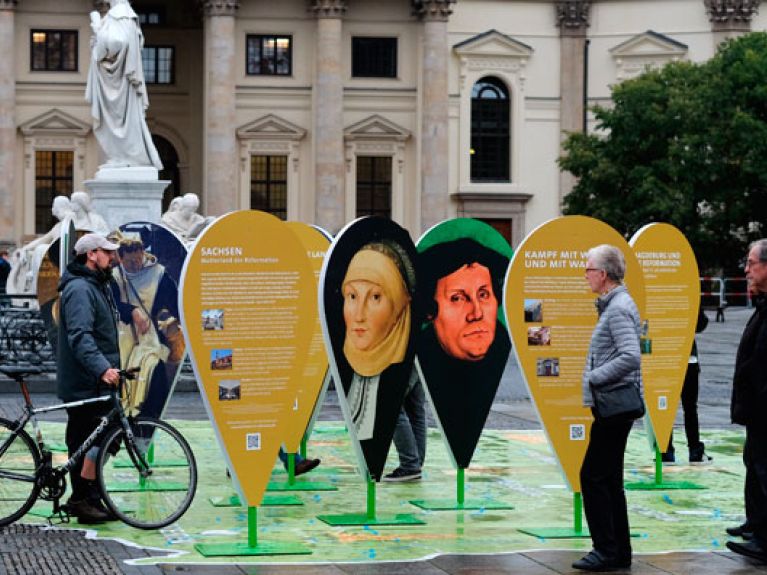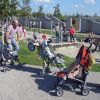500th anniversary of the Reformation in Germany – A belief in dialogue
International visitors on the Reformation trail in Germany – and talking to members of different religions.

The first surprise that greeted Yury Bachyshcha when he visited Germany was the realization that the State was involved in the celebrations to mark “500 years of the Reformation”. Bachyshcha is Professor of Belarusian History and Religion at the Europe Humanities University in Vilnius. In his homeland of Belarus, Bachyshcha sits on the committee that is also preparing for this important anniversary in 2017 – particularly since it coincides with the first translation of the Bible into Belarusian, also 500 years ago. In his country it was the Church alone that was responsible for convening the committee. And although only two percent of the population in Belarus are Protestants they are, as Bachyshcha puts it, “very committed”.
Somebody else who is very committed is Margot Käßmann, ambassador of the Evangelical Church in Germany (EKD) for the Reformation anniversary in 2017. This afternoon she is engaged in discussions with Bachyshcha and other international guests who have come to Berlin as part of the Federal Republic of Germany’s visitor programme. Over the coming days they will be travelling to important stopping-off points in Luther’s life – and thus to places of vital importance to the Reformation – going not only to the Wartburg but also to Erfurt and Wittenberg. Over the course of the trip, Bachyshcha is hoping for ideas about how to celebrate this anniversary of the Reformation. To begin with, he finds out from Käßmann that the German Bundestag decided back in 2011 that this anniversary was not only a Church matter. “It is part of German culture, which is why Church and State are collaborating.”
The “Luther Effect” all over the world
This morning, the international visitors have been provided with their first insights into one of the many things on offer to mark this anniversary year. Organized by Deutsches Historisches Museum, the exhibition “The Luther Effect” will be on at the Martin Gropius Bau in Berlin as of April 2017. It is one of three special national exhibitions in connection with the anniversary. Talking to the exhibition organizers the guests discover that – contrary to what the name suggests – the exhibition is not really about the reformer himself. “Our focus is not on Luther,” explains curator Ann-Kathrin Ziesak. “What we really want to show is that nowadays Protestantism has many different faces.” Which is why the exhibition looks at Sweden, South Korea, Tanzania and the United States. It examines the history of faith in the respective countries and Protestant life there today – partly in terms of its relationship with other religions.
The visitors get an idea of interreligious dialogue in Germany at a meeting with representatives of different religious faiths. Berlin-based imam Osman Örs explains how everything started for him: “I was forced, in a manner of speaking, to engage in dialogue because of the 9/11 attacks. For me, they represented not only an attack on innocent people, but also one on my religion and my values.” Nowadays, Örs is involved in Forum Dialog, an initiative set up by German Muslims for the purpose of cultural and religious interchange. The initiative also supports the planned construction of a “House of One” – a communal place of worship for Christians, Jews and Muslims in Berlin. “When I heard about the idea for the first time it sounded utopian, unreal, to me,” reports Örs. Nowadays he considers it quite possible that such an establishment might open one day.
The anniversary as a “global event”
However, for a number of the international visitors peace between the different religions remains wishful thinking. “For me, the dialogue I am hearing about is very far away”, reports Emma Ndaendelao Nangolo of the Evangelical Lutheran Church in Namibia. “I experience interreligious conflicts every day.” Galib Huseynov from the Organization of Islamic Cooperation in Saudi Arabia commented that in many countries, increasing islamophobia is impeding the dialogue between the different communities of faith.
Luther was also well known for his violent dislike of Muslims and Jews – this dark side of the reformer will be a subject referred to repeatedly during the anniversary year. According to Käßmann, the days when Luther was hailed as a “great German hero” at jubilee celebrations are now over, adding that it is all the more important for the anniversary to become an international celebration, “a global event focussing on people”.
Something else that the visitors ask Käßmann is what Luther would think about life in present-day Germany. “He would probably be shocked, more than anything else, that nowadays so many people in Germany do not have any kind of belief. He wouldn’t be able to believe that.” More than one in three people in Germany are unaffiliated with any religion. In east Germany – the region where Luther lived and worked – the figure is considerably higher. And so is the anniversary of the Reformation to some extent about reforming the Church? “Definitely,” replies Käßmann, “the Church needs to change, every day.”
More on the Federal Republic of Germany’s Visitors Programme

